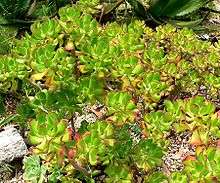Sedum dendroideum
Sedum dendroideum, commonly known as the tree stonecrop[2] or the false hens-and-chickens, is a shrub-like perennial plant that looks much like its Sempervivum look-alike. Native to Mexico,[3] Sedum dendroideum plant thrives in warm, arid climates, as well as in cooler climates. It has been naturalized to California,[4] and Ohio.[5]
| Sedum dendroideum | |
|---|---|
 | |
| Sedum dendroideum at the San Francisco Botanical Garden | |
| Scientific classification | |
| Kingdom: | Plantae |
| Clade: | Tracheophytes |
| Clade: | Angiosperms |
| Clade: | Eudicots |
| Order: | Saxifragales |
| Family: | Crassulaceae |
| Genus: | Sedum |
| Species: | S. dendroideum |
| Binomial name | |
| Sedum dendroideum | |
Uses
Ornamental
Due to their appearance and hardiness, like many plants in the sedum family, tree stonecrop are cultivated as garden plants. In winter, its leaves turn red.
Traditional medicine
In traditional Brazilian medicine, the fresh juice from the leaves of the tree stonecrop plant is used for the treatment of gastric and inflammatory disorders. In 2005, a medical research paper was released studying its uses, finding it had antinociceptive and anti-inflammatory effects in mice.[6]
Ecology
References
- "Sedum dendroideum Moc. & Sessé ex A. DC". Integrated Taxonomic Information System. Retrieved October 26, 2011.
- "Sedum dendroideum". Natural Resources Conservation Service PLANTS Database. USDA. Retrieved 9 November 2015.
- "Sedum dendroideum". Germplasm Resources Information Network (GRIN). Agricultural Research Service (ARS), United States Department of Agriculture (USDA). Retrieved 25 January 2018.
- Calflora Calflora Taxon Report
- United States Department of Agriculture, Sedum dendroideum Moc. & Sessé ex A. DC. tree stonecrop
- Giany O. De Melo; David do C. Malvar; Frederico A. Vanderlinde; Priscilla A. Pires; Wellington S. Côrtes; Pedro Germano Filho; Michelle F. Muzitano; Carlos R. Kaiser & Sônia S. Costa (2005). "Phytochemical and pharmacological study of Sedum dendroideum leaf juice". Journal of Ethnopharmacology. 102 (2): 217–220. doi:10.1016/j.jep.2005.06.015. PMID 16054793.
External links


- Drought Smart Plants
- Sedum dendroideum